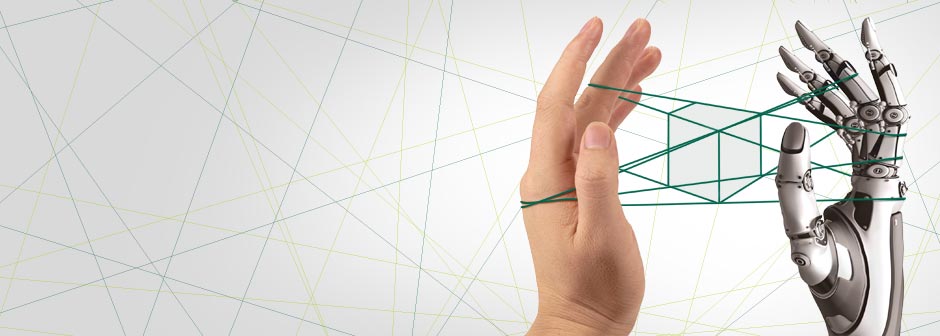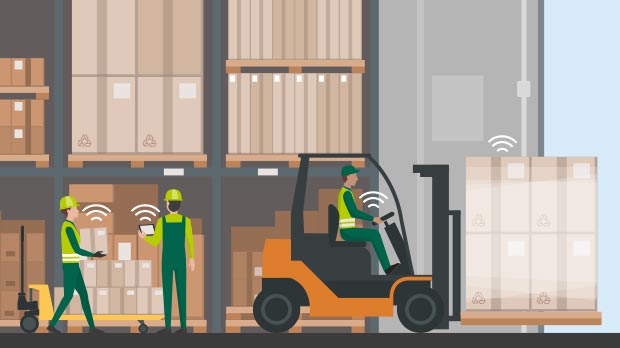We’re prepared:
Process innovation
through networking

* Pflichtfelder
Diese Angaben sind zur Anmeldung zum Newsletter "Packendes" notwendig.

Hardly any other topic occupies the manufacturing sector more than Industry 4.0 – ultimately, however, it’s about a continuous flow of data and information, the creation of a “smart factory” – a networked plant – and also the development of new business models and services. In this respect, we can safely say that we have already achieved a great deal in all three areas.


Deputy Manager IT:
Oliver Roggenkamp

“Networking and integration” are probably the dominant descriptions of our time. Whether via the Internet or sensors, people, machines, devices and products are increasingly able to communicate and network with each other. Systems and data close the gaps between individual process steps; this creates transparency throughout the entire value chain.
The technological possibilities behind Industry 4.0 therefore offer countless benefits – and we are already taking advantage of them today. Data is perhaps THE most important resource, and its integration is a central component of the “smart factory”. This is already a reality for us, because we ensure a seamless data flow from order receipt through all production stages, all the way to delivery to the customer. This allows us to react quicker to changes and potential problems, and become more efficient. This is especially important for us, since our production is always on an order basis and we need to organise our manufacturing processes to be extremely flexible. The 360° perspective and the data-supported overview of all process steps in the value chain also enable us to prevent errors, optimise our planning and make smarter decisions for the benefit of our customers.

Or would you prefer us to be a little more specific? Our customers can already submit their orders via an electronic data interchange (EDI) for repeat orders or standard packaging that does not need to be re-developed. Based on extensive algorithms and analyses, our SAP/APO planning system immediately tells us when we can produce the order and when we can deliver – and the customer receives an electric order confirmation. The availability of colours and tools, set-up times, downtimes, typical order processing times – all of this is taken into account in the system-supported decision-making process. If capacity in one plant is full, the system provides transparency about free capacity at other Klingele sites, thus offering the possibility to relocate an order.
RFID technology enables transparency throughout our entire production and logistics processes. All paper rolls delivered to our corrugated cardboard plants in Germany are fitted with an RFID chip. During production on the corrugated cardboard system, the rolls are read by antennae and the exact paper consumption is recorded in the system. The remaining stock is then automatically transferred back into the system. This means that we are able to trace the finished product back to the inserted paper roll.

After the production of the corrugated cardboard sheets in the system, in other words especially in the further processing of packaging, the operating data is recorded in our Klingele IT system and the order is documented throughout all production and processing stages. Among other things, this enables the precise provision of material, tools and plates. We also use our system to record the results of the quality checks that we carry out during production, such as visual inspections or colour measurements. Finally, we fit all pallets leaving our production with RFID chips before they are checked in to the warehouse. This means that they can be found easily without long detours, which not only enables quicker dispatch but virtually eliminates erroneous deliveries.
Nevertheless, the advantages of RFID technology are far from exhausted. Many of our customers already receive electronic delivery notification as soon as the lorry leaves our premises. Through this, they already know which pallets are on the lorry and are also able to use the document to carry out the incoming goods inspection. What’s more, the supreme discipline lies in the possibility to use the RFID labels on the pallets for internal logistics processes, too: for example, companies that need to react quickly to market trends and “activate” our packaging quickly from their warehouse can integrate the RFID chips fitted by Klingele into their own production processes, thereby optimising their flow of goods. Our IT partner Stonegarden, in which we hold a stake, can help with implementation.

Nevertheless, the “Smart Factory” concept also entails predictive maintenance: for this purpose, we continuously set up further measuring points in our factories, which provide us with detailed information on the manufacturing process whilst considering a range of parameters, including energy consumption and usage data. This allows us to quickly detect deviations that indicate problems and to arrange maintenance before failures occur – it's all about predictive maintenance.

All this clearly illustrates that Industry 4.0 not only ensures the reliability of our processes, but above all, is the basis for a high level of product and service quality. This presents a wide range of benefits in everyday work: we commence work preparation at the right moment and do not lose valuable time. The lorries are ready to collect goods as soon as production is complete and deliver the goods to customers on time. And we also learn from the much-cited “machine learning” – from analyses of orders and complaints, for instance, we gain new insights and can, over time, optimise our ongoing processes. The result is significantly reduced throughput times and error rates throughout the entire production.

Our system integration – and our SAP system plays the central role here – also helps us to achieve even closer cooperation with our customers. As a result, we are not only able to import specific order receipts, but also automated customer forecasts into our system, thus optimising our planning even further. Through a supplier portal on our website, customers can also view the current status of their own packaging inventory in our warehouse; additional information services are in planning.
So you see, to understand the opportunities and potential of Industry 4.0, you don’t need to travel all the way to Hanover. To make even more of it together with you, we’ve already got the “ingredients” right here: data, technology, competence and that all-important pinch of motivation!